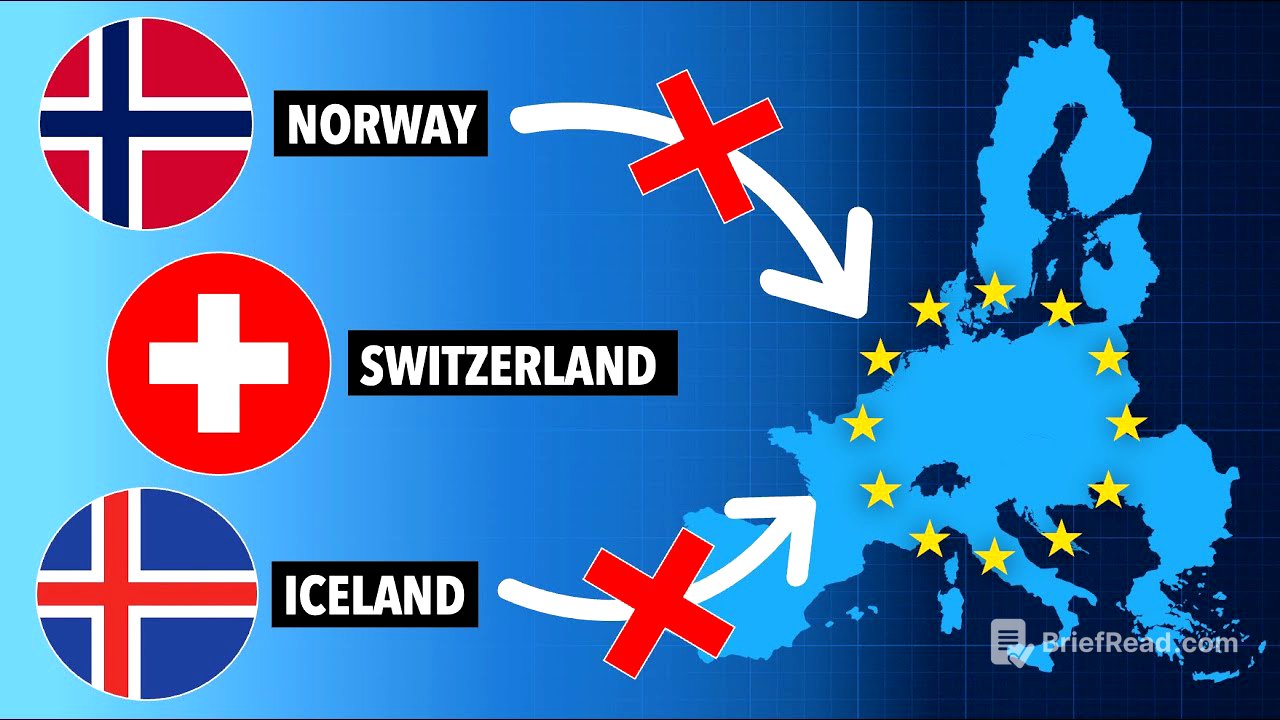TLDR;
This video explores why Switzerland, Norway, and Iceland, despite their close ties to Europe, are not part of the European Union. It examines each country's historical relationship with the EU, their reasons for remaining outside the Union, and their current agreements and collaborations with the EU. The video concludes by assessing the likelihood of each country joining the EU in the future, suggesting that while none are likely to join soon, Iceland is the most probable candidate.
- Norway's primary concern is maintaining control over its fisheries and natural resources, along with preserving national sovereignty.
- Iceland's hesitation stems from protecting its fishing industry, maintaining national sovereignty, and the advantages of controlling its own currency.
- Switzerland values its neutrality, direct democracy, and financial autonomy, preferring bilateral agreements with the EU.
Introduction: Why Aren't Switzerland, Norway, and Iceland in the EU? [0:00]
The video addresses the common misconception that "EU" is synonymous with "Europe," clarifying that the European Union consists of only twenty-seven member states. It highlights that some European countries with long-standing historical connections to the EU have chosen to remain outside the Union, specifically mentioning Switzerland, Norway, and Iceland. The video aims to explore the reasons behind these countries' decisions not to join the EU, despite their close ties to European identity.
Geographic Overview of Norway, Iceland, and Switzerland [0:25]
The video provides a geographic overview of the three countries. Norway is located at the top of the Scandinavian Peninsula, bordering EU members Finland and Sweden, and has access to the North Sea, the Arctic Circle, and the Baltic Sea. Iceland is the most isolated European nation, with its closest EU neighbor being Ireland, over 1,400 kilometers away. Switzerland is situated in the heart of the continent, surrounded by central EU states such as France, Germany, Italy, and Austria.
Norway's Relationship with the EU [1:17]
Norway has twice attempted to join the EU, initially applying to the European Economic Community (EEC) in 1962. However, France's veto of the UK's application in 1963 and 1967 indirectly affected Norway's bid, as its application was contingent on UK membership. Negotiations were successful in 1972, but a referendum resulted in Norwegians voting against joining. A subsequent referendum in 1994 also saw Norwegians voting against EU membership by a closer margin, and since then, Norway has not actively pursued full membership.
Factors Influencing Norway's Hesitation to Join the EU [2:08]
Several factors contribute to Norway's hesitation to join the EU. A significant concern is maintaining control over its fisheries sector, which is vital to its economy. Joining the EU would require Norway to follow the EU's Common Fisheries Policy (CFP), allowing other EU countries to fish in Norwegian waters and subjecting Norway to the EU’s Total Allowable Catches system. Economic concerns extend beyond fisheries, with Norway's vast natural resources, especially oil and gas, playing a pivotal role in its economy, leading to concerns about the country's autonomy over these resources. Additionally, many Norwegians are cautious about ceding aspects of their national sovereignty to the EU.
Iceland's Relationship with the EU [3:06]
Iceland applied to join the EU in 2009 following the financial crisis, with the belief that membership might offer greater economic stability. However, with a change in government in 2013, the country's direction toward EU accession shifted, and the application process stalled. Similar to Norway, Iceland's hesitation is rooted in the desire to protect its vital fishing industry from potential disruptions under the EU's Common Fisheries Policy. Concerns about maintaining national sovereignty, potential impacts on the small but protected agricultural sector, and the advantages of having control over their own currency have also influenced the debate. Public sentiment has shifted over time, influenced by both domestic and international events, including Russia's invasion of Ukraine.
Switzerland's Relationship with the EU [4:00]
The Swiss people have traditionally shown limited interest in joining the EU. In the early 1990s, the government pursued an application to join the European Economic Area (EEA), but after a rejection by the Swiss electorate in a 1992 referendum, this effort was suspended. A 2018 survey found that only 3% considered joining the EU a possibility. This reluctance stems from their commitment to neutrality and their unique political and economic circumstances. Switzerland's system of direct democracy makes ceding decision-making power to Brussels problematic.
Switzerland's Bilateral Agreements with the EU [4:42]
Switzerland has negotiated a series of bilateral agreements with the EU, granting them many of the benefits of the single market without the perceived drawbacks of full membership. These agreements allow for economic collaboration while preserving Swiss autonomy. The Swiss value their financial autonomy, given the country's status as a global banking and financial hub, leading to concerns about EU regulations potentially affecting this sector. Unlike some of their Nordic neighbors, the Swiss reservations aren't about protecting a fishing industry.
Current Agreements Between Norway, Iceland, Switzerland and the EU [5:23]
None of the three countries are technically part of the EU, but they are closely tied in various ways. All three countries are part of the Schengen Area, facilitating passport-free travel across borders, though this doesn't automatically grant the right to work. Iceland and Norway are members of the European Economic Area (EEA), allowing them to participate in the single market, contribute to the EU budget, and adopt certain EU laws without direct representation in the European Parliament. Switzerland accesses parts of the single market through a series of bilateral agreements with the EU. All three, along with Liechtenstein, are members of the European Free Trade Association (EFTA), which promotes free trade among its members and with other countries, ensuring smooth trade and collaboration across Europe.
Likelihood of Joining the EU in the Future [6:49]
The video concludes that none of the three countries are likely to join the EU soon. Switzerland is the least likely due to its low public opinion on joining and its strong dedication to neutrality. Iceland is the most likely, as it is already part of the EEA, has close ties to the EU, and has never held a decisive referendum on joining. The 2009 recession showed the Icelandic people the value the EU’s economic Union offered, and Russia’s invasion of Ukraine has many looking to their European neighbors for solidarity. However, there is no big reason for any of these countries to join at the moment, as they all enjoy close relations with the EU, take part in many of its agreements, and contribute in their own way to the European project.









